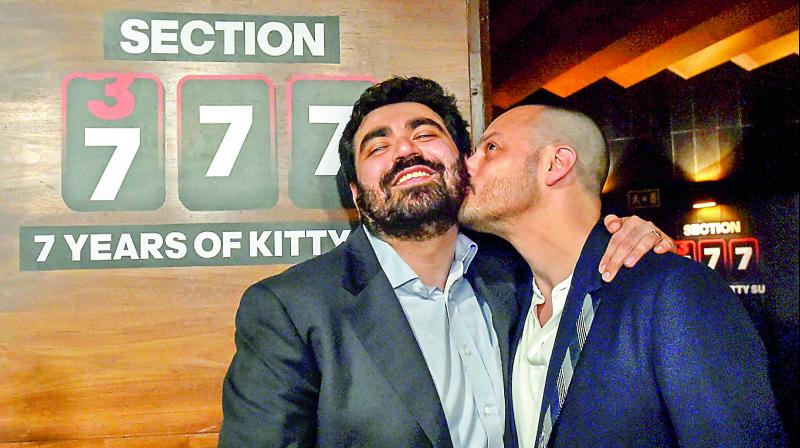Gays free, equal, legal, rules Supreme Court
Consensual sex is a private affair, says Supreme Court.

New Delhi: In a historical and path-breaking judgement, the Supreme Court on Thursday partially struck down as unconstitutional the 158-year-old colonial law Section 377 of the IPC which criminalises consensual homosexual acts between two consenting adults. It held that homosexuality, lesbian, gay sex or unnatural sex between a man and woman is no more an offence for prosecution of the offender.
In a unanimous 493-page verdict, a five-judge Constitution Bench declared Section 377 of the IPC unconstitutional, insofar as it criminalises consensual sexual acts of adults in private. It clarified that such consent must be free consent, which is completely voluntary in nature, and devoid of any duress or coercion. The court also said that the provisions of Section 377 would continue to govern non-consensual sexual acts against adults, all acts of carnal intercourse against minors, and acts of bestiality or any kind of sexual activity with an animal.
CJI Dipak Misra wrote for himself and Justice A.M. Khanwilkar. Justices Rohinton Nariman, D.Y. Chandrachud and Indu Malhotra gave concurring verdicts giving additional reasons. The court, while striking down part of the Section 377 that criminalises consensual gay sex, said it was “irrational, indefensible and manifestly arbitrary”. The CJI said that criminalisation of consensual carnal intercourse, be it amongst homosexuals, heterosexuals, bi-sexuals or transgenders, hardly serves any legitimate public purpose or interest.
Consensual carnal intercourse among adults, be it homosexual or heterosexual, in private space, does not in any way harm the public decency or morality. Therefore, Section 377 IPC in its present form violates Article 19(1)(a) of the Constitution. The CJI said, “Social morality cannot be used to violate the fundamental rights of even a single individual... Constitutional morality cannot be martyred at the altar of social morality.”
CHRONOLOGY
2001: Naaz Foundation, an NGO fighting for gay rights, files PIL in Delhi HC seeking legalisation of gay sex among consenting adults.
Sep 2004: HC dismisses the PIL; Gay right activists file review petition.
Nov 3: HC dismisses review petition.
Dec: Gay rights activists approach SC against the HC order.
Apr 3, 2006: SC remands the case back to HC, directs it to reconsider the matter on merit.
Oct 4: HC allows senior BJP leader B P Singhal's plea, opposing decriminalising gay sex, to be impleaded in the case.
Sept 18, 2008: Centre seeks more time to take stand on the issue after contradictory stand between Home and Health ministries over decriminalisation of homosexuality. HC refuses the plea and final arguments in the case begin.
Sept 25: Gay rights' activists contend that the government cannot infringe upon their fundamental right to equality by decriminalising homosexual acts on the ground of morality.
Sept 26: The Centre says gay sex is immoral and a reflection of a perverse mind and its decriminalisation would lead to moral degradation of society.
Oct 15: HC pulls up the Centre for relying on religious texts to justify ban on gay sex and asks it to come up with scientific reports to justify it.
Nov: Govt in its written submission before HC says judiciary should refrain from interfering in the issue as it is basically for Parliament to decide.
Nov: HC reserves verdict on pleas filed by gay rights activists seeking decriminalisation of homosexual acts.
July 2, 2009: HC allows plea of gay rights activists and legalises sexual activity among consenting adults of same sex.
July 9: Delhi astrologer challenges HC verdict in SC. Several other pleas challenging the judgment also filed.
Feb. 15, 2012: SC begins final day-to-day hearing in the case.
Feb 2, 2016: SC refers curative pleas on homosexuality to five-judge bench.
June 29, 2016: SC refers the plea of celebrities like dancer N.S. Jauhar, chef Ritu Dalmia and hotelier Aman Nath, for quashing of Section 377 of the IPC, to a bench already seized of the matter.
Aug 24, 2017: SC declares privacy a fundamental right under the Constitution, observes that “sexual orientation is an essential attribute of privacy:.
Jan 8, 2018: SC agrees to reconsider its 2013 decision, refers plea challenging 377 to a larger bench. 20 students and alumni of the IITs join the fight.
July 11: Five-judge bench commences hearing on pleas. Centre leaves it to the wisdom of Supreme Court.
July 12: SC rejects demand for referendum over constitutional validity of Section 377 saying it would not go by majority opinion.
Sept 6: Supreme Court unanimously decriminalises part of Section 377.
